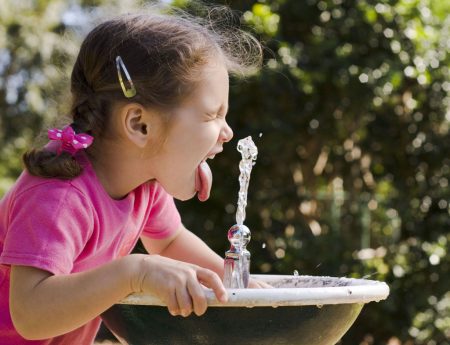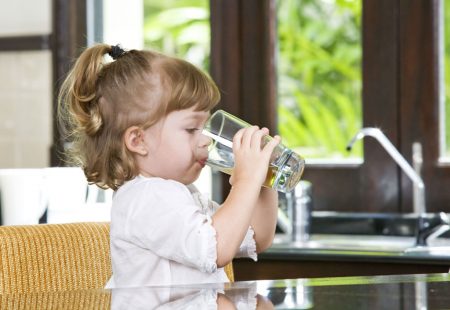Fluids, fluids and more fluids – they are the secret weapon to making it through a steamy hot day. It is important for kids to avoid sugary drinks and caffeinated beverages because they cause the body to release fluids, adding to dehydration.
According to the Natural Hydration Council, children are at a greater risk of dehydration than adults as they have higher water requirements in relation to their body weight. Their bodies don’t cool down as efficiently as adults, making them much more prone to dehydration. Unlike adults, children usually have to ask for a drink when they are thirsty, relying on their parents/caregivers to keep them hydrated.
Taking these few simple precautions will protect your child and allow them to enjoy the summer fun safely:
- Make sure your child gets plenty of liquids to stay healthy, especially with the upcoming warm weather.
- Don’t wait until your child is thirsty to offer refreshment; by that time he/she is already dehydrated.
- Get your child in the habit early on by scheduling frequent beverage breaks during activity, about every 20 minutes, especially in warm weather.
- When choosing drinks for kids, avoid those that have caffeine, such as iced tea and soda. Those beverages might taste refreshing, but the high sugar content is unhealthy and should be avoided for hydration.


Signs that Your Child is Dehydrated
Tiredness is one of the first signs of dehydration. This associated tiredness will further impair your child’s attention span, memory and motor skills, all of which will negatively impact upon their academic progress at school/day care. Even mild dehydration can impair many aspects of your child’s brain function. Other signs of dehydration are dry mouth, headaches, muscle cramps and dizziness. Don’t wait until you notice these symptoms; instead be proactive by having your child drink plenty of water.
Our body needs water for good health and survival. Water makes up more than half of our body weight, and each organ in our body needs water to function properly. The amount of water a child should consume varies due to factors including age, gender, the weather and how much physical activity they do. It is advised that kids aged 4-13 aim to drink approximately 6-8 glasses of fluid a day in addition to the water included in the food in their diet.
Drinking Water Boosts Productively in School/Day Care
Water is constantly being lost from our body – when we go to the bathroom, when we breathe, and when we sweat – so if we don’t drink enough we become dehydrated. Water helps our body in many ways as it carries nutrients to cells, helps remove waste products from our major organs, and helps control our body temperature.
As a parent/caregiver you play an important role in helping your child develop healthy hydration habits, therefore ensure you are offering them sufficient amounts of water to maintain proper hydration. Drinking water will boost your child’s productivity and help them to concentrate and feel revitalized throughout the school day.

At Little Friends School, not only do we provide a warm, caring and supportive atmosphere, but we also encourage children to drink plenty of water to stay hydrated.



